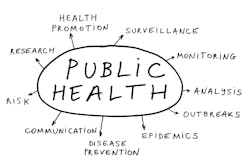A Centers for Disease Control workgroup has developed a social determinants of health (SDOH) public health business case and has designed three public health-focused use cases for chronic disease prevention and health promotion that extend on those developed for clinical care by the HL7 Gravity Project.
The CDC’s Social Determinants of Health (SDOH) Public Health Use Case Workgroup convened and collaborated with industry experts including federal, state, and local multi-sector partners, to advance SDOH data exchange for chronic disease prevention and health promotion. The workgroup followed the framework of the Gravity Project, a national public collaborative developing structured data standards to help reduce barriers for documenting and exchanging social risk and protective factors within the healthcare enterprise and other sectors.
When the workgroup was launched earlier this year, Karen Hacker, M.D., M.P.H., director of CDC's National Center for Chronic Disease Prevention and Health Promotion, led off an introductory meeting on April 20. “As we see screening going on for social needs within the healthcare system, with the data being collected in electronic health records, we felt that it was important to be at the table, and to be developing the public health use cases about how this information on social determinants of health on social needs could be interpreted by public health and used by public health for decision-making,” she said.
The business case developed for the initiative notes that it is “challenging for partners such as public health agencies, providers, and policymakers to access and thereby act on data about an individual’s or community’s social determinants. These partners often work in siloed sectors, resulting in disconnected technical systems with incomplete, unstructured, and outdated data. This makes it more difficult to proactively address the health and well-being of individuals and communities, such as supporting immediate needs for interventions and services.”
The five priority SDOH domains the CDC’s National Center for Chronic Disease Prevention and Health Promotionis addressing are:• Built Environment. The built environment is human-made surroundings that influenceoverall community health and individual behaviors that drive health.• Community-Clinical Linkages. Community-clinical linkages are connections madeamong health care systems and services, public health agencies, and community-basedorganizations to improve population health.• Food and Nutrition Security. Food and nutrition security exists when all people, at alltimes, have physical, social, and economic access to food that is safe and consumed insufficient quantity and quality to meet their dietary needs and food preferences. ThisSDOH domain also requires an environment of adequate sanitation, health services, andcare, allowing for a healthy and active life.• Social Connectedness. Social connectedness is the degree to which individuals orgroups of individuals have and perceive their desired number, quality, and diversity ofrelationships that create a sense of belonging and being cared for, valued, andsupported.• Tobacco-Free Policy. Tobacco-free policies are population-based, preventivemeasures to reduce tobacco use and tobacco-related morbidity and mortality.The use cases focus on the functionality and interoperability required to allow an end-user to send and exchange coded SDOH-related data.
The three use cases are:
• Community Health Needs Assessment Leveraging Individual Level Social Care Data;
• Assessment of STLT [State, Local and Territorial] Health Department Diabetes Programs; and
• Monitoring Federal Program Successes for Individual, Program, and Population Health Advancement.
The workgroup stressed that this initiative will not focus on defining SDOH or Race, Ethnicity, Sex, Primary Language, Disability, Sexual Orientation and Gender Identity (SOGI) data elements or data exchange standards.


